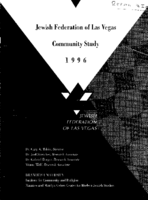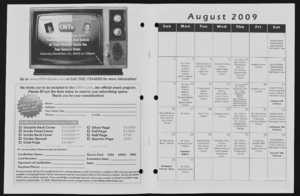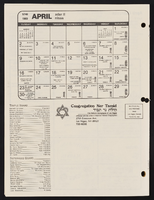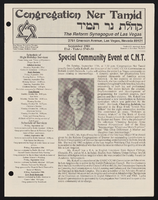Search the Special Collections and Archives Portal
Search Results

Transcript of interview with Lt. Harry Fagel by Barbara Tabach, April 15, 2016 and January 13, 2017
Date
Archival Collection
Description
In the signature line of Harry Fagel?s emails is a reads: Be the light in dark spaces. This illumines the person that Harry is both as a police officer and a poet in Las Vegas. Harry is native Las Vegan, who has served the community with the Las Vegas Metropolitan Police Department for nearly 30 years. He currently is a police lieutenant serving in Laughlin, Nevada. In addition, Fagel is a respected poet, writing both for the public and on commission. He performs in the local poetry scene. He also has showcased his poetry in two published books, released an album, and is a recipient of the Hilliard Endowment Grant from the University Nevada, Reno. Fagel is a graduate of the University of Nevada, Las Vegas, and currently lives in Henderson with his wife, Leilani and two sons, Sam and Jake. In this interview, Fagel discusses his family background, how his grandparents came to live in Las Vegas in the 1950s, as well as his relationships with both his mother and father. He recalls his early jobs which included working for his cousin Freddie Glusman?s restaurant Piero?s and for Circus Circus-long before becoming a policeman. His involvement with the Jewish community started young and he shares how it has evolved over the decades. In addition, Fagel reflects upon his career as a law enforcement officer, the progressiveness of the Las Vegas Metropolitan Police Department, and changes in relations between the police and communities, both locally and nationally. Lastly, Fagel talks in detail about his poetry, its dominant themes, and the local poetry scene.
Text
Set of photographs including a program at Bethel, Ray Feaster's daughter, A.D.L., Lodge Chapters taken at St. James, and Hellen Corratha's fortune teller
Date
Archival Collection
Description
Photographer's notations: Program at Bethel, Ray Feaster's Daughter, A.D.L., Lodge Chapters taken at St. James 9-27-66, Hellen Corratha's Fortune Teller.
Image

Photographs of Israel Independence Day concert, 2007
Date
Archival Collection
Description
Group of photographs of various events celebrating Israel Independence Day, 2007.
Image
Freddy Fender recordings, 1979 to 1980
Level of Description
Scope and Contents
Fender talks about politics, illegal immigration, taxes, money management, hard work, and religion.
Fender discusses his past mistakes, his religious views, his birth name, racism in the U.S., his experience in prison, race relations of that era, his opinion of the Equal Rights Amendment (ERA), his views on capital punishment, the growing country music culture in Austin, Texas, his new album titled Yours, and the love of his fans.
Archival Collection
Collection Name: Arnold Shaw Interviews and Performance Recordings
Box/Folder: Digital File 00
Archival Component

Transcript of interview with Robert D. "Bob" Fisher by Barbara Tabach, January 8, 2015
Date
Archival Collection
Description
Robert D. "Bob" Fisher is a Las Vegas, Nevada broadcast personality and lobbyist. He was born in Minneapolis, Minnesota and moved to Las Vegas in 1994 when he was hired to be the founding president and CEO of the Nevada Broadcasters Association (NVBA). During his 22 years as head of the NVBA, he produced and hosted Observations, a public affairs program broadcasted on radio and television throughout the state of Nevada. Soon after, he began producing and hosting the only weekly live television program about diabetes in the United States; in 2015 his weekly live radio program The Diabetes Show was the only one of its kind to be aired over commercial radio in the U.S. Fisher helped bring the AMBER Alert program to Nevada in 2003, and served as its chairman and coordinator for ten years. His other lobbying successes include the classification of certified broadcasters as First Responders and the elimination of Broadcaster Non-Compete contracts in 2013. He served on the Nevada Homeland Security Commission for 13 years, the Nevada Crime Commission, and the Governor's Defense Base Closure and Realignment Commission. Fisher is a founding clergy member of Midbar Kodesh Temple in Henderson, Nevada and served as its cantor for over a decade. After his retirement from NVBA at the end of 2014, he established Bob Fisher Weddings to provide his services as a wedding officiant. In this interview, conducted shortly after his retirement from NVBA, Fisher discusses his childhood in Twin Cities, and the large role Judaism played in his upbringing. He speaks at length about his involvement with United Synagogue of Conservative Judaism over the years, including as regional director of the United Synagogue Youth Far West Region, which took him from Minnesota to California. He talks about his time in Los Angeles, and later, about his life in Las Vegas, including his broadcasting career as well as involvement with Midbar Kodesh Temple.
Text
Barbara Fuson oral history interview
Identifier
Abstract
Oral history interview with Barbara Fuson conducted by Darnell Frazier on March 20, 1981 for the Ralph Roske Oral History Project on Early Las Vegas. Fuson discusses Las Vegas, Nevada culture in the 1960s including medical care, the education system, gambling, politics, and religion.
Archival Collection

Jewish Federation of Las Vegas Community Study, 1995
Date
Archival Collection
Description
This study was conducted in 1995 when an "estimated 55,600 Jews live[d] in 29,100 Jewish households in the Las Vegas area. An additional 11,200 plus non-Jewish persons live[d] in these households, for a total of 66,900 people living in Jewish Las Vegas households."
Text



